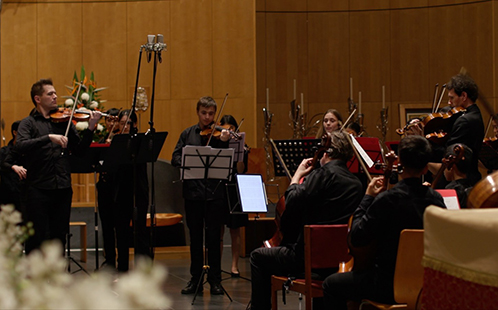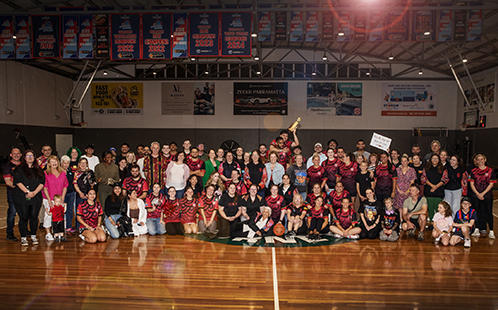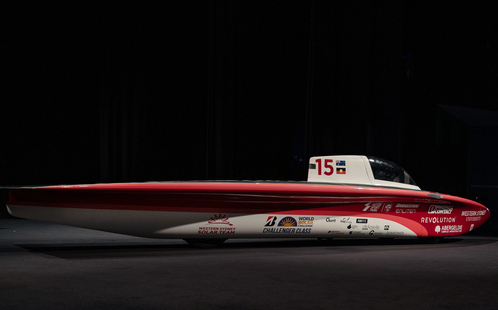News Centre

Western Sydney University and Microsoft join forces to prepare students for an AI-driven world
Western Sydney University and Microsoft have joined forces to unlock new opportunities to empower students to succeed.
Latest news

Western Sydney University partners with NSW Police Force to deliver real-world preparation for one of the state’s most vital public service careers
Western Sydney University is entering a new strategic partnership with the NSW Police Force to help train future police officers to protect, lead and serve their communities in New South Wales.

Western Sydney University and Western Sydney Philharmonic strike a high note with exciting new partnership
Western Sydney University and Western Sydney Philharmonic announce a partnership that will strengthen music education, increase access to musical performances and career pathways.

Indigenous Students vs Staff Basketball Match brings community together
Western Sydney University hosted its annual Indigenous Students vs Staff Basketball Match on Friday, 26 September at the Hills Basketball Stadium, drawing a lively crowd of students, staff, and community members.

Western Sydney beats the world four years in a row for community impact
For an unprecedented fourth year in a row, Western Sydney University has outranked 2,300 international universities to be named the world’s best for delivering community impact.
Western Sydney stories

Western launches next gen solar car, UNLIMITED 6.0
Western Sydney University’s Solar Car team have today unveiled their most innovative and advanced solar car design yet, ‘UNLIMITED 6.0’.

Opinion: Students don't take they are net givers
Australians resoundingly rejected the Coalition’s key election proposal to slash net overseas migration, specifically targeting foreign students and temporary skilled workers.
Thought leadership

Chancellor's Address: Women UNLIMITED Leadership Summit
The following address was deliverd by Western Sydney University Chancellor, Professor Jennifer Westacott AO at the Women UNLIMITED Leadership Summit on Wednesday, 1 October 2025.

ABC RN transcript: Vice-Chancellor Professor George Williams discusses higher education sector, student support, and the impact of AI
The following is a transcript of an interview that aired on ABC Radio National Saturday Extra between presenter, Nick Bryant and Vice-Chancellor, Distinguished Professor George Williams AO.
Research success

Western Sydney University researchers contribute to global call for urgent overhaul of food systems to combat land degradation crisis
Western Sydney University researchers have contributed to a landmark international study warning that urgent action is needed to transform global food systems to avert a land degradation crisis.

Improved stroke detection in women will save lives and millions in healthcare costs, new study finds
A new study has found that improving pre-hospital stroke identification accuracy in women to match that of men will lead to significant health benefits and cost savings for all Australians.
Expert opinion

Opinion: Australian farmland values are at lofty heights. Research reveals this could be hurting some farmers
Over recent decades, farmland values in Australia have soared. Nationally, the price of broadacre farmland has increased by more than eightfold since 1992.

Opinion: AI has produced 2 new antibiotics to kill ‘superbugs’. It’s promising – but we shouldn’t get too excited yet
Researchers from the Massachusetts Institute of Technology have used artificial intelligence to design two new antibiotics effective against antibiotic-resistant bacteria, or “superbugs”.
Awards and appointments

Western Sydney University researchers named as finalists in the 2025 Eureka Prizes
Western Sydney University researchers have been named among the finalists selected for Australia’s leading science awards, the Australian Museum Eureka Prizes.

Honouring Indigenous academic excellence and community leadership at Western Sydney University’s NAIDOC Gala Dinner
Western Sydney University recognised the outstanding contributions of Indigenous students, staff and community members at its annual NAIDOC Gala Dinner on Friday 11 July.
Student spotlight

Ayla Hibbert studies social work to empower mums and communities
Ayla Hibbert, is a 29-year-old Bachelor of Social Work student at the Liverpool City campus.
Balancing university, work, and being a single mum, she describes her studies as deeply rewarding.

Medicine, community, and culture – Ryan Blake’s journey at Western Sydney University
Ryan Blake currently lives and studies at Western Sydney University’s Campbelltown campus. Originally from Young in regional NSW, he is enrolled in the Bachelor of Clinical Science/Doctor of Medicine (MD) program.
Mobile options:
